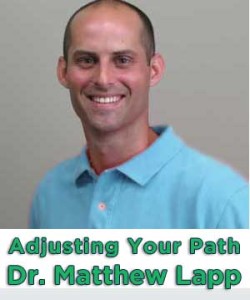Spring is a good time for people to examine their diets
By Dr. Matthew Lapp, MS, DC, Columnist, The Times
 Spring is a natural time of cleansing, detoxification, and renewal. For many people this means evaluating their current diet. As a health and wellness professional, food and diet are one of the most common areas of questioning that I receive. Regardless of your age, personal nutrition is one of the most important factors to consider when creating a well-rounded plan for health and well-being.
Spring is a natural time of cleansing, detoxification, and renewal. For many people this means evaluating their current diet. As a health and wellness professional, food and diet are one of the most common areas of questioning that I receive. Regardless of your age, personal nutrition is one of the most important factors to consider when creating a well-rounded plan for health and well-being.
I don’t have all of the answers, but I want to offer some suggestions and resources that may help you. As far as nutrition goes, the simpler, the better. Quick fix diets and weight loss supplements can be dangerous and are not sustainable, and they may even lead to greater weight gains and poorer eating habits. A more sustainable option is to consciously create an eating plan that leads you to your health and well-being goals.
Often, the reason or meaning that you associate with a new change in behavior has a lot to do with the long term likelihood of success. For example, if you want to lose a few pounds in order to create a better beach body in the short term, you might not be as invested as you would be if you saw the benefits for your family or yourself over a lifetime.
A great book by food activist Michael Pollan, called Food Rules is one of my favorite resources for simple, practical action steps toward gaining a better understanding and appreciation of the food we consume. In his book, Pollan asks, and then subsequently answers, three simple questions, which are addressed below:
Question: What should I eat?
Answer: Eat food.
It seems self-evident that you would eat food, what else is there to eat? But, consider the types of food that many people consume on a regular basis. When was the last time you looked at a food label and saw items that you’ve never heard of? How many ingredients were there? A good rule of thumb is that the more ingredients something contains, the more highly processed it is likely to be.
One way to solve this problem is to learn to grow your own food. Plant a few vegetables around your home, adopt a bed at the Coatesville Community Garden, or work with your neighborhood to create a place where people can share a patch of soil. If you grow it, your know what it is, where it came from, how it was raised, and will cut costs associated with buying it from a third party.
Another way to get real, wholesome food is to shop locally at the Coatesville Farmers’ Market. Starting on May 11th, the Farmers’ Market will be open every Saturday in Gateway Park from 10am-2pm.
Question: What kind of food should I eat?
Answer: Mostly vegetables.
Personally, I love to eat a great steak from the grill, but I know that I can’t do it at every meal. Some people choose to eat only fish and chicken, fruits and vegetables or non-animal products for health or social reasons. I tend to agree with the comment I heard from a student recently. She said, “I like my plate like I like my community, diverse.”
How ever you choose to fill your plate, the majority of its contents should be made of various vegetables and plants, try raw if you want to take it a step further. Also, starting your meal with a hearty salad may help curb your appetite for less nutrient dense items.
Meat should be more like a side dish or flavoring. Also, eating high quality meat from animals that have been humanely raised and who have eaten well themselves insures that you are getting the best quality product possible. Studies have shown that these types of animals have higher levels of vitamins, minerals, and “good fats” like omega-3s.
Question: How should I eat?
Answer: Not too much.
Have you ever considered what relationship you have with food? Do you eat according to your emotions, eat on the run, or gobble down your food?
I call these behaviors “un-conscious eating” habits because there’s no relationship with the food. When this happens we may consume more calories because the brain needs about 20 minutes to catch up with what’s happening in the stomach. If we take our time, eat slowly, and stop just before a feeling of fullness sets in, we are able to have better awareness of the needs of our bodies and in turn, create a better relationship with our food. You may notice that slowing down leads you to savor and enjoy your food more fully as well.
The truth is that diets and eating plans do not come in a “one-size-fits-all” package. In order to find the eating plan that works best for you, as well as the frequency, quantity, and quality of meals that bests suit your needs, you have to take inventory.
Try writing down everything you eat for a week, or if that’s too much, start with a day. Notice how you feel after you eat each meal or snack. Notice if you feel your energy levels changing in response to different foods and adjust accordingly. The more aware you are of what you’re eating and how you’re eating, the more likely you’ll be able to make positive, sustainable changes in your diet and in your life.
Matthew Lapp, MS, DC is the owner of Salus Chiropractic Studio in Thorndale. For more information, visit him on the web at http://www.thorndalechiropractor.com/






